Are you Vanlife curious? Have you considered the lifestyle for yourself? Making the jump to move your whole life into a van can be really frightening. There are so many questions and uncertainties about transitioning to vanlife. If you are struggling to figure out if vanlife is right for you, we want to help by sharing our personal expertise.
You may be tempted by glamorous Instagram photos of oceanside sunsets, carefree road trips, and ultimate nomadic freedom. And it’s fine to chase those highlight moments for yourself because they are certainly attainable.
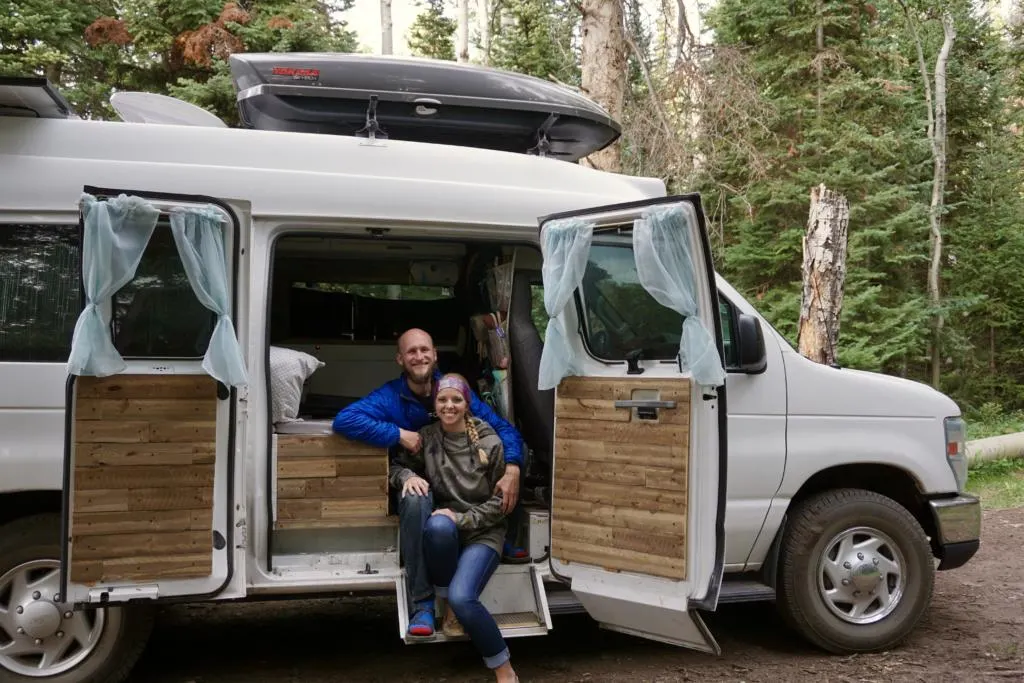
But it’s important to keep in perspective that people usually only share the best moments. And that’s not really a knock on van dwellers, almost everyone on social media is guilty of only sharing their highlights.
Remember that vanlife doesn’t excuse you from all the regular mundane moments in life. You still have to brush your teeth, cut your toenails, pay off your credit cards, apply for jobs, etc. So between all the amazing highlights, there are plenty of less interesting moments.
So it’s important to get an accurate picture of the entirety of vanlife before making the transition.

Since you are already here, I’m gonna assume that you know most of the positives of vanlife. Such as; no rent, freedom of movement, freedom to travel, bringing your “house” with you everywhere, and so on. These amazing benefits are what make the lifestyle so desirable.
But there are obviously some hidden challenges and expenses too. Your life will change in many ways, some obvious, and some not so obvious.
So everyone thinking about vanlife will have to weigh the positives versus the negatives. Luckily, it’s not a “one size fits all” lifestyle, so there is plenty of flexibility to create a van life that fits you.
So let’s break down all the factors to help you figure out if vanlife is right for you.
This post may contain affiliate links. Disclosure policy.
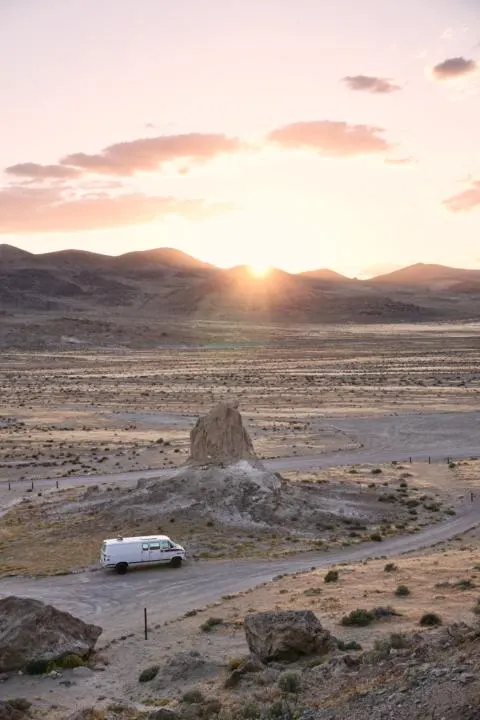
What Are You Trying to Achieve?
If your only goal is just to live in a van, then you will probably feel let down once you start vanlife. As an end goal, there’s nothing incredibly special about living in a van. It’s not particularly easy, comfortable, or convenient.
HOWEVER, vanlife can be the key to unlocking all kinds of other possibilities. The two main benefits of vanlife are freedom from rent payments, and freedom of movement. But what you want to do with that freedom will ultimately decide if vanlife is right for you?
If you’re spending all your time and energy working a job that you don’t like just to pay rent each month. Then you probably don’t have enough time to pursue your passions and go after the things that you really want in life.
With vanlife, thousands of people are finally finding the freedom they need to chase their dreams.
So first, figure out what it is you want to achieve.
Priorities Versus Sacrifices
Vanlife is all about sacrifices.
What are you trying to achieve? And what you’re willing to give up to get it?
This is the most important framework from which to evaluate vanlife.
Because when you move your whole life into a vehicle, you are obviously going to have to give up certain things. It could be personal belongings, creature comforts, certain lifestyles, your “normal” routines, etc.
And it’s difficult to say with 100% certainty what is and isn’t possible in vanlife. But unless you have an unlimited budget, you can’t have it all.
And there are plenty of logistical issues associated with living in a vehicle, that you really can’t avoid regardless of budget. (i.e. not having a permanent address).
But with your budget, skills, and creativity, what kind of comfortable van life can you build for yourself? Write down what your priorities are, and then make a plan to build your van life around those priorities.
Our Story of Sacrifice
Rather than continuing to speak in abstraction, here’s a real-world example of our personal sacrifice.
Our main priority for vanlife was the freedom to travel. Without a rent payment, we could actually afford to take the trips that we always dreamed of.
The hardest decision that Emily and I made was to give up our ski and snowboard lifestyle (for now). We had been living in Vail, Colorado for the past 5 years, so skiing was a HUGE part of our life.
But we painfully came to the realization that carrying around a snowboard, skis, boots, helmets, and all the associated clothing was going to take up too much space. And it’s an expensive hobby that you can’t even do year-round.
Pros
- Skiing is Awesome and Fun!
- We could travel to new ski resorts
- Fun way to visit friends
- Resort towns have lots of seasonal jobs
Cons
- Storage space for gear
- Expensive lift tickets
- Cold weather sucks in a van
- No free parking and camping options
- Can’t afford 4WD van
- Not a year-round activity
This Pros and Cons list helped us make the hard sacrifice to give up skiing and snowboarding (at least temporarily). But to be clear, there definitely ARE solutions to almost everything on the Cons list.
We could get a season pass that allowed us to ski at many different resorts. We could buy a heater for the van, and thicker insulation. We could reach out to friends or offer strangers money to park in their driveway, etc.
But a lot of the solutions cost money or require compromises. So for us, the sacrifice to make skiing a regular thing during vanlife was too great.
But we have plenty of friends that think we are crazy! “What do you mean you’re not going to ski?!?!?” To them, no challenge is too great to give up skiing. They would make it a priority to get a 4WD van, winterize it, and figure out a place to park their van in the winter.
So, what are your priorities? And what are you willing to sacrifice to make them happen?
What Are Your Plans?
Are you hoping to transition to vanlife full-time for a year or more? Or are you more interested in just doing a several month road-trip and then returning to your normal life?

If you’re ready to go “all-in” and convert to full-time vanlife, then you are probably going to be willing to spend more money on your campervan. This isn’t some short vacation, so you want your van to be comfortable and ready to be your home for the foreseeable future.
On the other hand, if you just want a short-term road trip, then you probably won’t spend as much money on your van or could even just rent one. For short-term living, you can probably tolerate living with fewer luxuries.
You also may be able to just travel on savings, and not have to worry about working or finding jobs. And you can avoid a lot of the logistical problems by keeping your house or apartment, or just putting your belongings in a storage unit while you “road trip”.
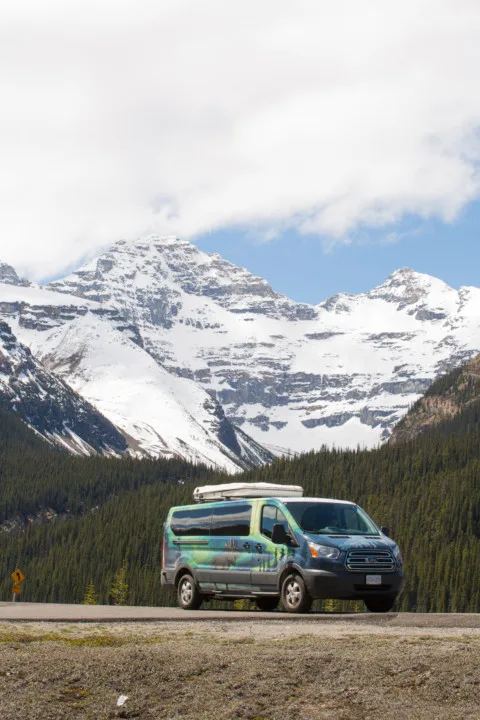
Many campervan rental companies like Outdoorsy and Escape Campervan allow you test out the lifestyle to figure out if vanlife is right for you. (read: Best Camper Van Rentals Companies)
Who’s Living With You?
Are you going to live in your van by yourself, or will you share it with your significant other or pet?
If there’s two of you then you need to be on the same page, because it’s difficult to pursue different objectives. Be open and honest to make sure that sharing a vehicle as your house and transportation will actually work. Here are our best tips for living vanlife as a couple.
If you have any pets or kids, then that can add another layer of challenges. I cannot really speak on either since I don’t currently have any pets or kids.
But there are plenty of people doing it, so you can find guidance on the unique challenges.
How Will You Make Money?
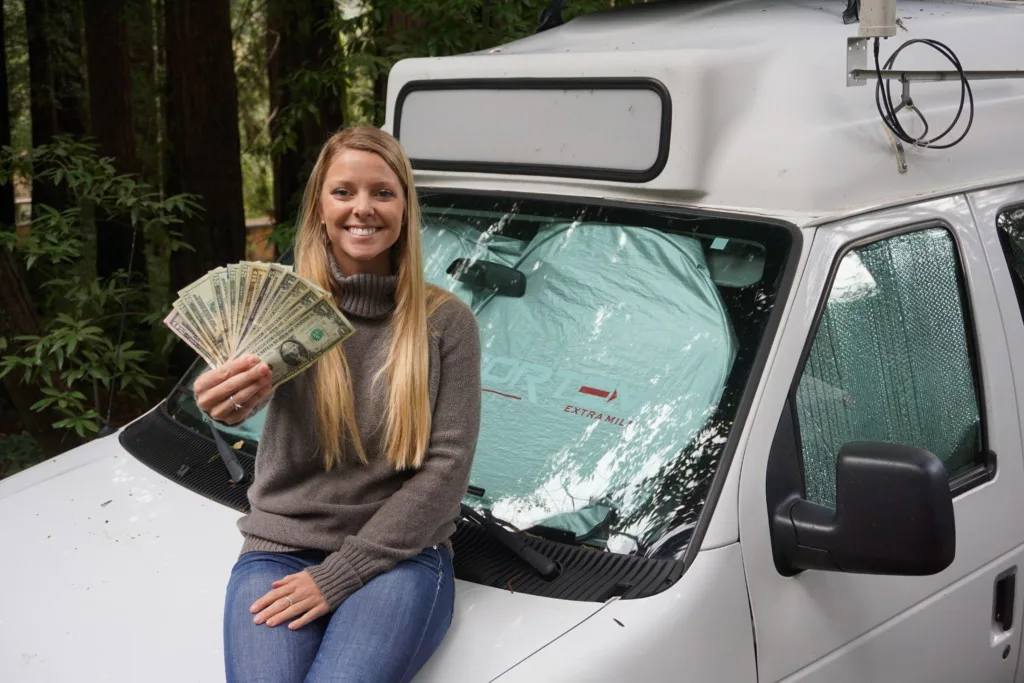
How will you make money once you convert to vanlife? Unless you are retired, then you have to make money somehow to support your new lifestyle.
The good news is that vanlife is generally way cheaper than renting or mortgaging a traditional home. So you may not need to make as much money to live comfortably.
There are several types of jobs that are very popular for Vanlife. The most common options are remote jobs, seasonal/short-term, and workamping.
Remote Work
Remote work is more possible than ever, but that doesn’t mean that it’s easy to turn it into a full-time income. Especially when you’re just starting out. A couple common remote work jobs are freelancer, blogger, virtual assistant, and many more. (Read: 12 Remote Jobs You Can Do From Anywhere In The World)
But the biggest challenge for remote work is figuring out how to get reliable internet and wifi on the road. Your solution to this problem may be a huge deciding factor in figuring out if Vanlife is right for you.
Because if you can’t get reliable internet, then you probably won’t be able to maintain a remote job.
If you make your own hours, then it’s a little bit easier. But working a traditional 40-hour work week can be a bit tough. If you mostly stay around cities and towns, then it’s pretty easy to get internet. But if you like to travel off-grid, then having access to WiFi or cell signal will be a challenge.
Remote or mountainous areas can be especially difficult to find cell service. A popular option for getting internet in remote areas is Starlink, but it’s expensive. Here’s our Starlink review of whether or not we think this cutting-edge satellite-based internet is worth it.
Seasonal or Short-Term Employment
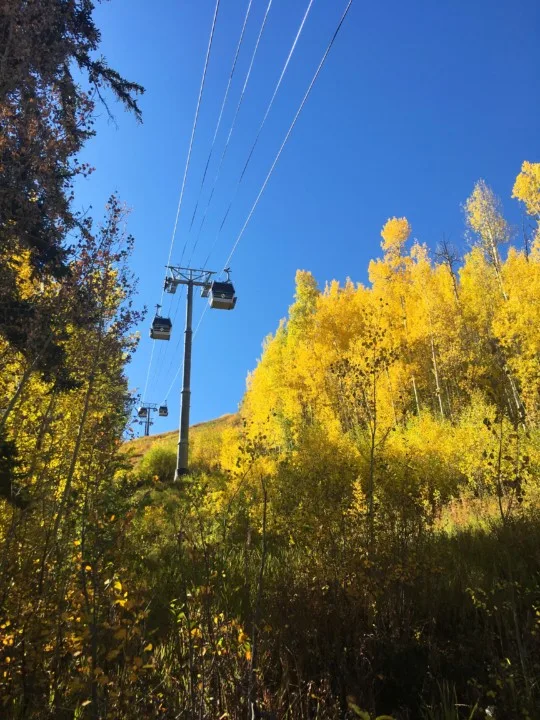
Or another great option is to work for a couple of months at a time. You can pick up seasonal or short-term jobs, and then travel in between.
These jobs can be in some of the most beautiful places, like National Parks, ski resorts, beaches, golf courses, and campgrounds. The jobs can actually be in the parks or resorts themselves, or in the supporting industries like restaurants, shopping, tour guides, etc.
We have been involved in some sort of seasonal employment for nearly a decade. It’s one of the ways that we make vanlife possible for us. (Here’s our guide on working seasonal jobs).
An awesome perk of this strategy is that when you are in between jobs you can truly relax and enjoy life without worrying about jamming a remote job into your lifestyle.
Workamping
Workamping (or Work Camping) is when you work at a campground or resort in exchange for a free campsite.
They usually provide you full hookups (electricity, water, wifi, etc) in exchange for general upkeep of the campground.
It may include maintenance, cleaning, landscaping, administrative, and other odd jobs. They often only require something like 10-30 hours of work per week, which gives you lots of time to explore the surrounding area.
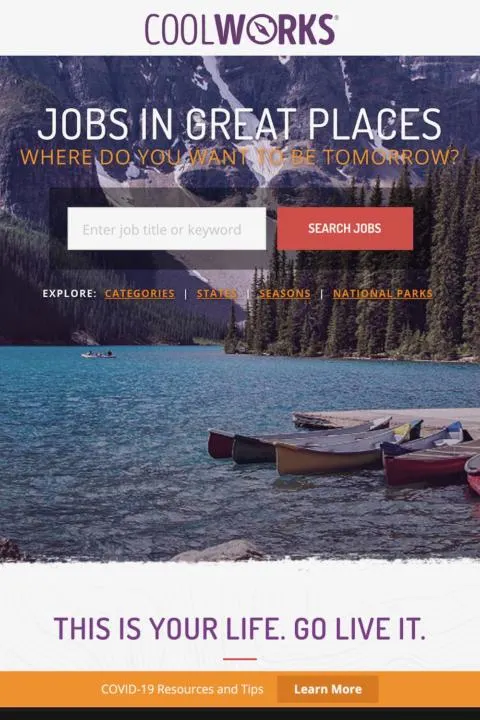
Workamping positions usually don’t pay any wages, but some do. For that reason, workamping is more popular among retirees who don’t need regular income.
So just the payment in a free place to stay makes it worth it. But you might also be able to find some great vanlife workamping jobs that do pay.
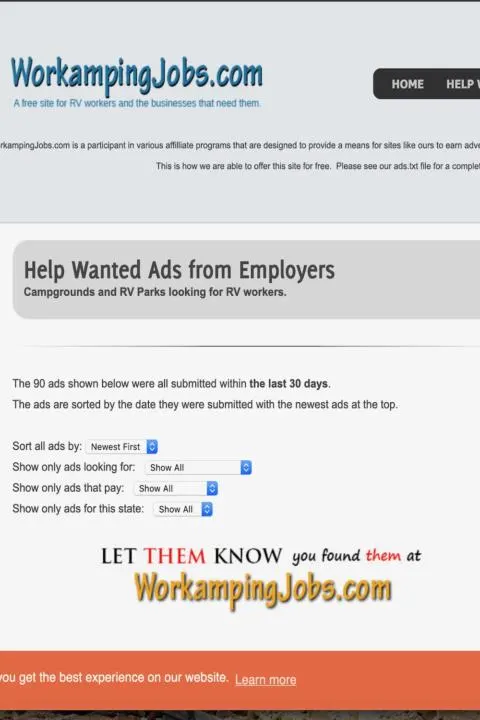
Workamping jobs are specifically designed to accommodate Vanlifers and RVers.
Your nomadic status is actually a prerequisite for getting hired, rather than a potential strike against you like it is for “traditional” jobs.
In addition to a free campsite and full hookups, they may also provide laundry, showers, and other really helpful amenities. You can rest easy knowing that your lifestyle is welcomed and appreciated.
Below are some great resources for finding jobs in vanlife.
What Can You Afford?
Once you know roughly what you intend to do for income, you can figure out what you can afford.
So for starters, how much money can you afford to spend on your campervan?
There’s a campervan for every kind of budget. You can buy an old used campervan for $1,500 and be ready to go. But it probably won’t be that nice, and you will likely deal with high maintenance costs. Or you can spend over 100K on the most high-tech Mercedes Sprinter campervan.
Luckily, there are a million “Goldilocks” options in between those two extremes. Falling somewhere in between is where the majority of vanlifers exist. (Read: How Much Did Our Van Conversion Cost)
And remember, “the happiest people don’t have the best of everything, they make the best of everything.” This is a mentality that many vanlifers live by because it helps them let go, and embrace living with less material things.
Once you get your van, what are the monthly expenses for supporting your desired lifestyle?
You can live for extremely cheap if you mostly stay in one place and eat ramen noodles for 3 meals a day.
Or you can live like a king, eating out all the time and traveling thousands of miles.
And of course, there are tons of lifestyle options in between.
Here is our guide for budgeting for Vanlife.
What Can You Live Without?
Once you determine what your budget is, you can figure out what kind of campervan you can afford. What amenities will your campervan will have, but more challengingly what WON’T it have.
There are lots of normal things that you are used to having, that you probably won’t have in your van. The first things to go are usually a shower, flushing toilet, washer/dryer, and oven.
So can you figure out how to live without having easy access to these things?
For showers, most vanlifers get a gym membership or use campgrounds, friends’ houses, etc.
But again, I don’t want to paint with too broad a brush. It IS possible to have a shower in your van, but it does cost money, and logistically requires a lot of water.
This goes back to that “priorities vs sacrifices” idea from the beginning. (Read: How To Find Showers On The Road)
And for living without a flushing toilet, you can read about How We Go To The Bathroom In Our Campervan.
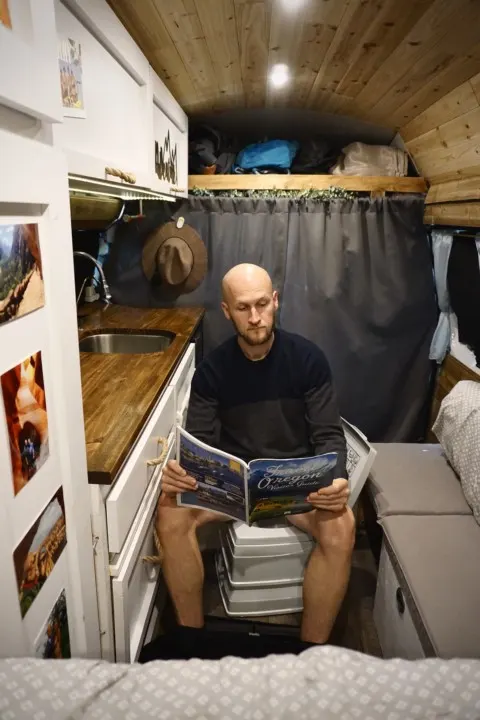
To wash your clothes you will almost certainly have to use a laundromat. It is possible to wash your clothes in a van, but none of the options are that fast or easy.
Vanlife can even affect your diet, just read about How Vanlife Changed What We Eat.
So to determine if Vanlife is right for you, figure out what things you absolutely must have, and what things you can live without.
Where Do You Want To Live/Travel?
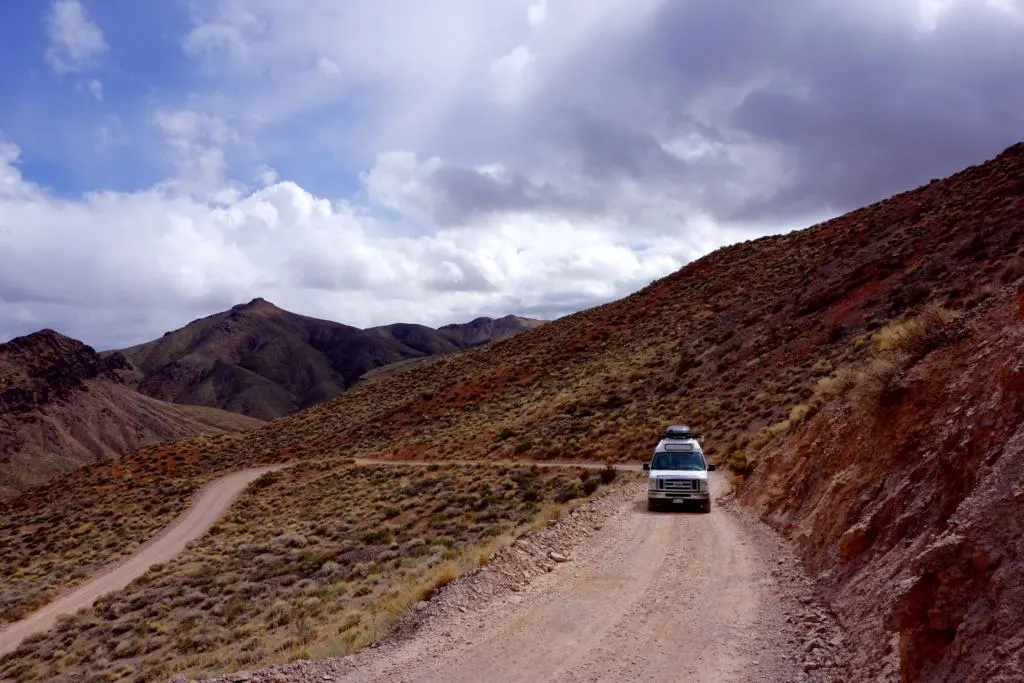
Do you want to spend your time out in nature camping and driving dirt roads? Do you hope to stay in cities and towns? Or are you hoping for a nice mixture of the two.
Not all towns are created equal in the eyes of vanlife. Some places are culturally very friendly towards the lifestyle, while others may be like “get off my lawn, you homeless dirtbags!!!”.
Without any property to call your own, your life will be largely influenced by how welcomed (or un-welcomed) you are.
Now here comes a sweeping generalization. The western United States is a lot more vanlife-friendly because there is simply more space for people to spread out.
The eastern half of the US is more heavily populated, so it just means that van dwellers are forced into closer contact with “regular” people. Kind of like an endangered species that’s losing its habitat to a growing population of humans.
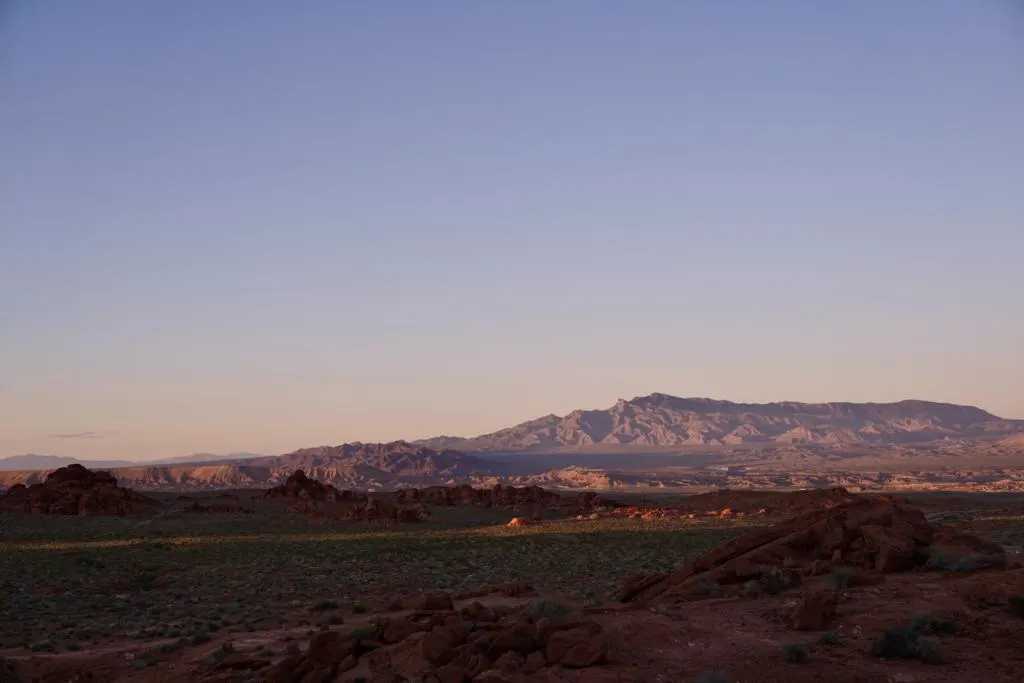
Additionally, the West has so much more public land and camping infrastructure. There are more places to fill propane, find water spigots, etc.
The East tends to have mostly established campgrounds that you have to pay for. And paying for campgrounds every night will make vanlife almost as expensive as just renting an apartment. Kind of defeating the purpose.
And climate/weather is a huge factor. Living in a van, quite literally, narrows the gap between you and the outside weather. If it’s hot, you’re hot. If it’s cold, you’re cold. Sure, there are plenty of ways to control the temperature in your van (insulation, heating, AC, etc). So you may win a few battles, but Mother Nature will always win the war.
Or if it rains, it’s really loud inside the van. If it’s windy, your house will start rocking.
So unless you can always travel where the weather is comfortable, be prepared to face the elements.
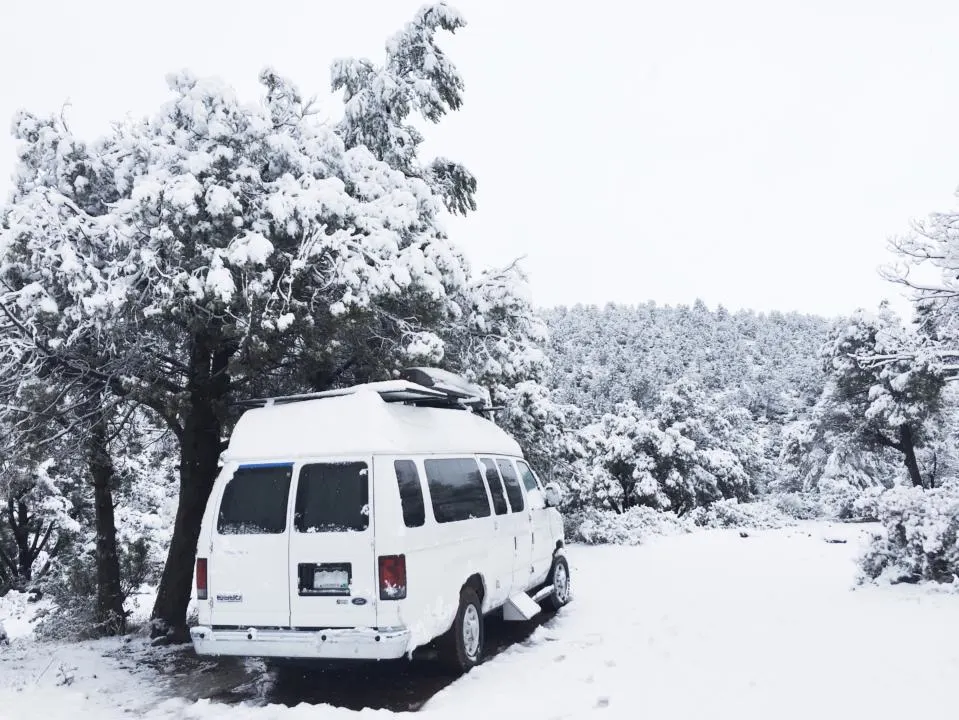
Where Will You Park?
Once you decide where you want to “live/travel”, then it’s time to figure out if there are viable places to park. And there’s a big difference between finding a place to park for a night or two, and finding a place to park for months on end.
If you’re always on the move, then you won’t overstay your welcome in any one place.
A night in a Walmart parking lot or neighborhood street is a decent stop-gap, but not a viable long-term solution.
But if you’re trying to live a “traditional life”, as in, staying in one place and commuting to work or school every day, then locals are going to start to take notice. Especially if you are parking in places that you aren’t allowed or welcome.
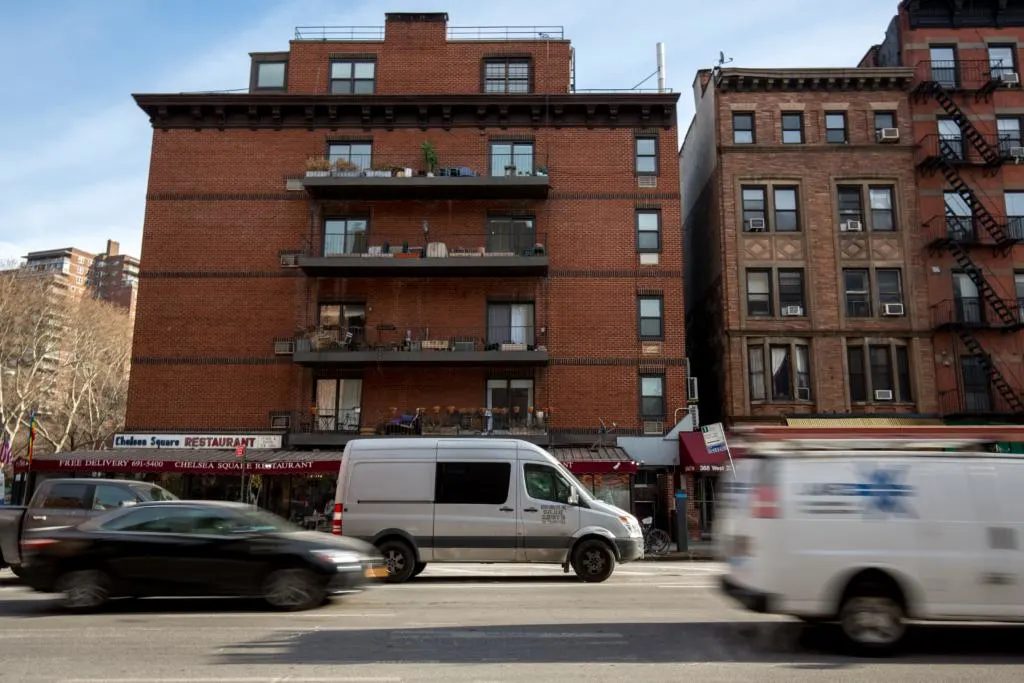
There are plenty of urban van dwellers, but the challenges they face are unique. They don’t need to worry about finding gas or groceries, but they constantly need to worry about where to park.
But you should be aware that in some cities, it’s illegal to sleep in a vehicle when parked on city streets. So that pretty much rules it out, unless you want to “stealth camp” (which would be illegal).
Stealth camping is when you design a campervan to look like a regular generic van so that nobody suspects that someone is living inside. So you can forget about putting that bike rack on the back of your van. (Read our guide for Stealth Camping here).
But urban vanlife is still enticing for many people because that’s where the majority of jobs are. And the cost of housing in cities makes alternatives more appealing.
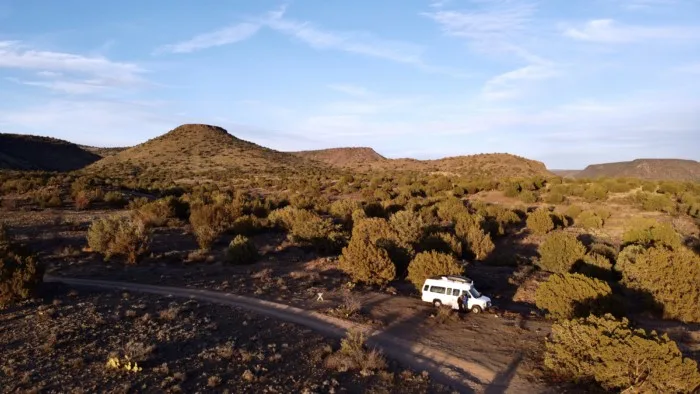
Or maybe you’re more like us and want to mostly avoid cities. The kind of camping we mostly do is called boondocking, wild camping, or primitive camping and it’s when you camp somewhere without any facilities. (read: Beginners Guide to Wild Camping and Boondocking)
We find plenty of places to park and camp for free, but instead, we have to worry about a different set of challenges. Some wild camping issues are rough dirt roads, wildlife, restocking on supplies, and getting reliable internet. And we usually have a long “commute” into town.
To re-visit our example from before: Living in Vail, Colorado in a campervan is pretty challenging. Free parking is extremely limited, even for the residents who own or rent a house there.
It’s also a small town where there isn’t really any chance of stealth camping, because everyone knows what a campervan is. In the summer it is possible to camp on public land within an hour of town. But in the winter there are almost zero options for free overnight parking.
So you really need to be intentional about how and where you plan to park at night. It’s definitely one of the biggest challenges of vanlife.
We usually use a variety of apps and websites to help us find free parking like iOverlander and Freecampsites.net.
But we have an entire post dedicated to:
Or you can hop onto forums like CheapRVliving or reddit (r/vandwellers, r/vanlife) to read about parking discussions or ask people who live in certain areas for guidance.
Vanlife is Dirty, Messy, and Unpredictable
Vanlife is dirty, messy, and unpredictable. If you are outside more and showering less, then it’s just inevitable. Sand in my bed used to be one of my biggest pet peeves, but I had to adapt because it’s just a normal part of our outdoor-oriented vanlife.
And when you live in a small space, your van will get messy fast! It only takes a few minutes to create a complete pigsty. But luckily small spaces are easier to clean up.
Vanlife can be very unpredictable. Sometimes during dinnertime, you are still trying to figure out where you are going to sleep that night. Or sometimes your van will break down, and now you don’t have a house until a mechanic can fix it.
One time we returned from a backpacking trip in Utah to find out that our fridge had broken before we left. We were really looking forward to a cold beverage, but that plan was quickly turned upside down.
We were about 50 miles down a rough dirt road with no cell service. So we were thrust into a situation trying to salvage any groceries that hadn’t gone bad. And the 85F degree weather made not having a fridge even harder.
Logistical Challenges
Society is largely designed around people living in normal homes with a physical address and working a regular job. So choosing a lifestyle outside that framework causes some logistical issues.
The biggest challenges are receiving mail, voting, registering vehicles, insurance, and healthcare.
There are many ways to get mail on the road, but they don’t solve the problem of needing an address for employment, voting, vehicle registration, banking, etc. Luckily, many services have gone paperless, but not everything.
So some vanlifers use a friend and family member’s address as their “permanent” address. But then you are relying on them to send your mail along if you can’t pick it up. This isn’t really the best long-term solution because it puts an unfair burden on friends and family.
You can sign up for Mail Forwarding or Virtual Mailbox services. They will receive mail for you, and some even provide you with a physical address that you can use for voting, banking, registering vehicles, etc. A few popular ones are Traveling Mailbox, Anytime Mailbox, and US Global Mail.
Or if you are working multiple jobs across different states, then doing your taxes becomes more of a hassle.
As you can see, living an alternative lifestyle outside the normal framework of society can cause some issues. So it is worth considering how you plan to address these logistical problems. They aren’t insurmountable problems, but they also aren’t trivial.
Mental & Social Challenges
Then there are all of the immeasurable mental and social challenges of vanlife. For example; safety, security, community, mental health, lifestyle, and so on.
When you live in a vehicle, you probably won’t feel as safe as you do in a home. This obviously depends on where you spend your time. But almost no matter where you are, campervans are an enticing target for thieves. Parking on the street in a city, or in a sketchy Walmart parking lot might leave you feeling pretty exposed.
Or there’s a different set of dangers if you’re in the backcountry (wildlife, lack of cell service, weather, etc). Trailheads often have signs that say “Don’t leave valuables in your vehicle”. And when your whole life is in your vehicle, you don’t really have that option. So nearly every time we go hiking, there’s a little fear in the back of our mind that we will get robbed.
Oh, and one time a bear climbed onto our van’s roof during dinner. Needless to say, we didn’t sleep great that night. If you are ever in Lake Tahoe, California, watch out for the black bears, they are NOT SHY!
It can be very hard to quantify the mental burden of factors like these. None of them are completely insurmountable, but together they can really ruin your ability to enjoy vanlife.
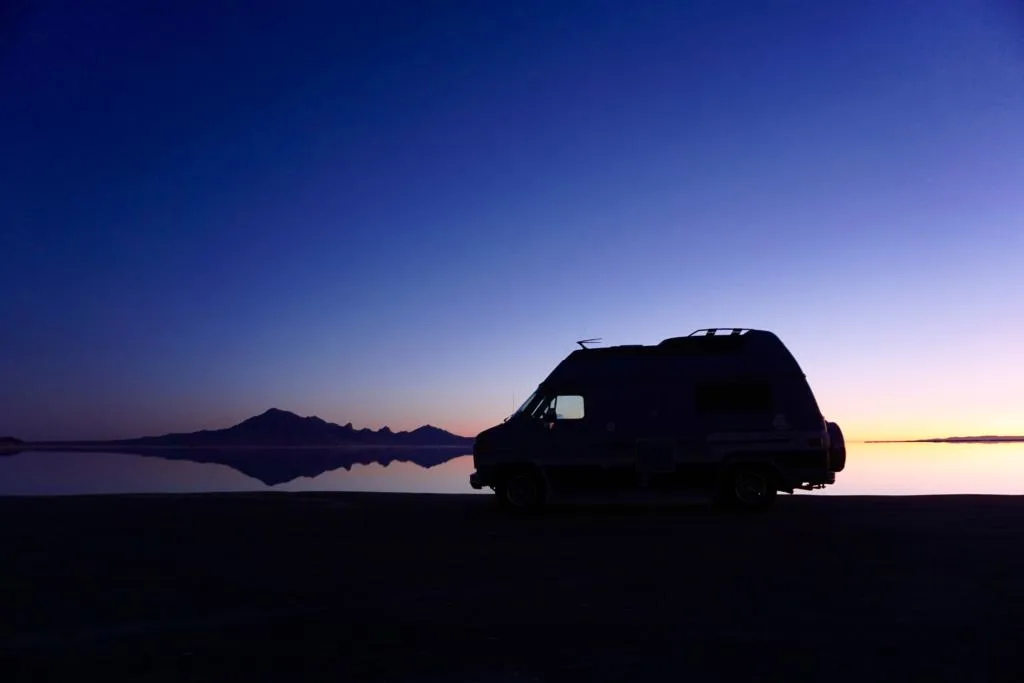
For solo vanlifers, the amount of time alone in a vehicle can be very isolating. It’s hard to hang onto a regular sense of community if you’re always on the move.
And finding romance is especially challenging because most people may view van dwelling as a “deal-breaker”. Luckily, within the van dwelling community, people are generally really nice and open-minded. But even then, it can be hard to foster a traditional relationship.
Or if you are living vanlife with a significant other, you will face a different set of challenges. Couples may find it hard to live in a 60 sq. ft. box together. It simply doesn’t afford you that much personal space.
And it can be hard for couples to pursue different jobs and hobbies when you both share a single vehicle (that’s also your house). (Read: Our Tips for Vanlife Couples)
A lifestyle that is full of constant change and uncertainty can be mentally draining. It takes tons of time and energy to always find a place to park for the night, find water, get your mail, and many other daily tasks. And there is almost certainly going to be way more driving in vanlife.
You need to make peace with change and uncertainty because you can never control all the external factors in vanlife. But you may even come to enjoy the constant change. It certainly isn’t boring or monotonous.
Takeaway
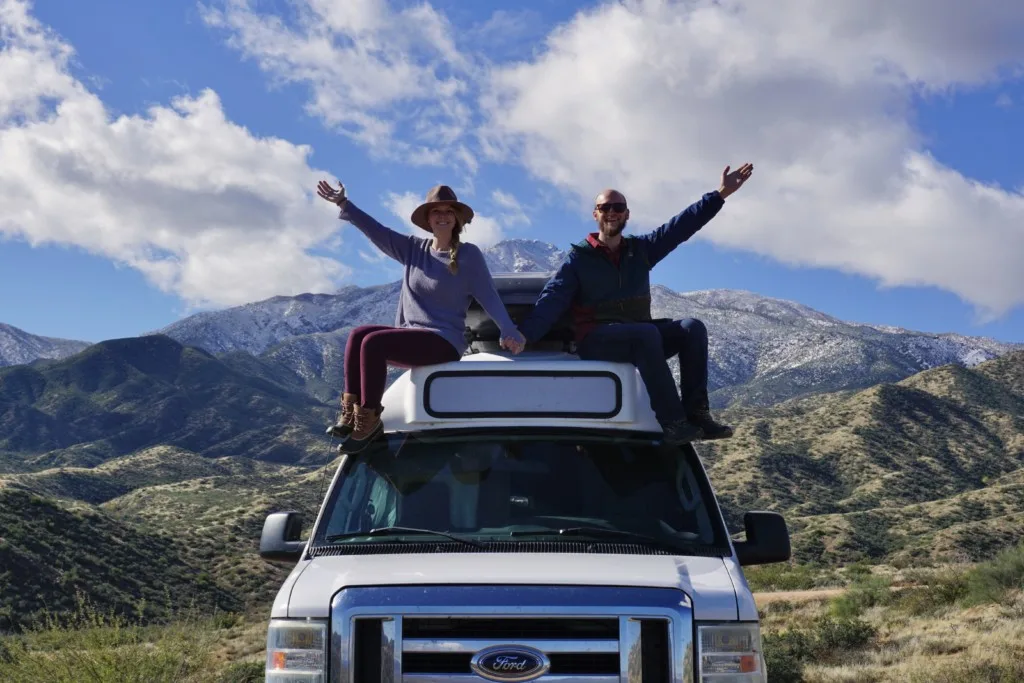
I know that I talked about so many challenges of vanlife. And I hope that I haven’t scared you off, because Vanlife is the BEST! It’s truly a unique and amazing lifestyle.
You can experience a level of freedom that money can’t buy! You can see more of the world in a year than most people see in their entire lives. You can save money to pay off debt, save for a travel fund, or anything your heart desires. You can finally find the time and money to pursue your passions.
But still, I feel obligated to show the complete picture of vanlife; the good, the bad, and the ugly. That way you can make an accurate assessment when deciding if vanlife is right for you.
Remember to figure out what you hope to achieve in vanlife.
Do you want to travel, focus on art or music, save money to buy a house? What are your goals and passions? Once you have your priorities, you can decide if the sacrifices are worth making.
And yes, while there are lots of challenges, we believe that the positives of vanlife are worth struggling for. If you want it bad enough, you can make anything possible with vanlife. Good Luck!
Save ‘How To Know If Vanlife Is Right For You?’ For Later
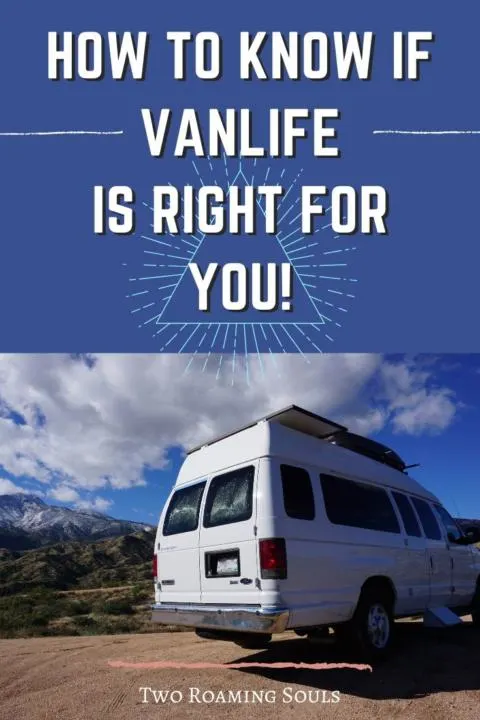


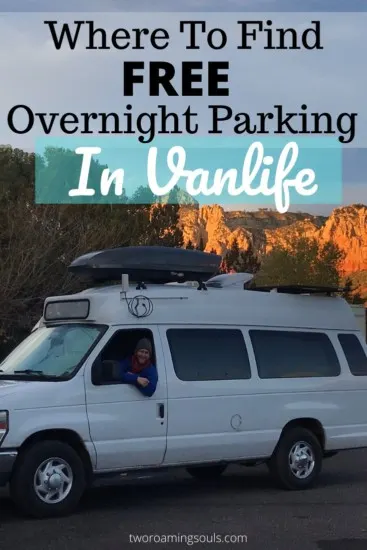
Buying A New vs Used Campervan - tworoamingsouls
Sunday 20th of December 2020
[…] If you are at all on the fence about vanlife, check out our post: How To Know If Vanlife Is Right For You […]
Unexpected Problems You Deal With In Vanlife - tworoamingsouls
Monday 23rd of November 2020
[…] But these problems are only part of the equation. Check out our post: How To Know If Vanlife Is Right For You. […]
Problems You Deal With In Vanlife You Might Overlook - tworoamingsouls
Monday 23rd of November 2020
[…] But these problems are only part of the equation. Check out our post: How To Know If Vanlife Is Right For You. […]
How To Choose A Van For A Campervan Conversion - tworoamingsouls
Tuesday 3rd of November 2020
[…] How To Know If Vanlife is Right For You? […]